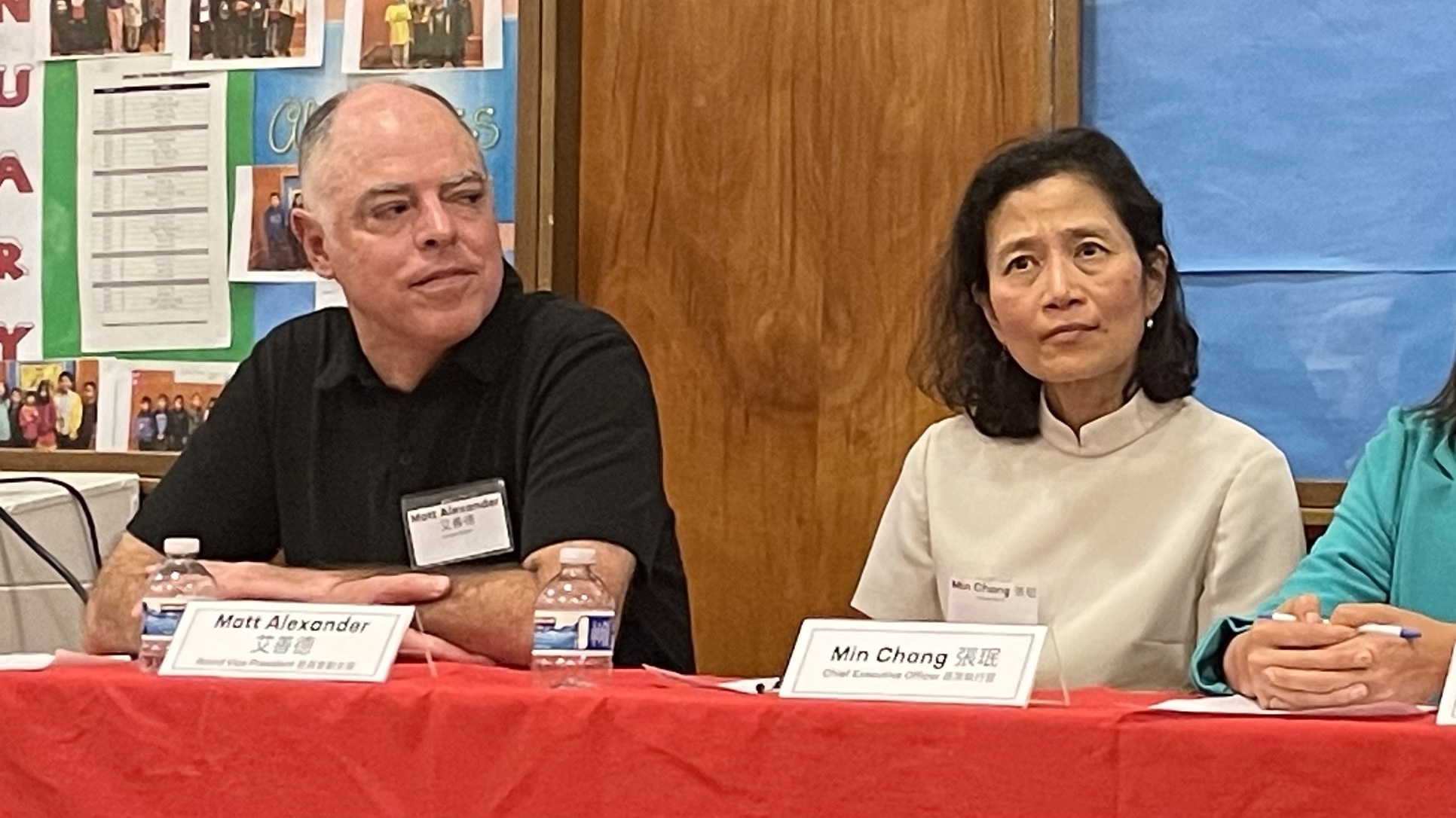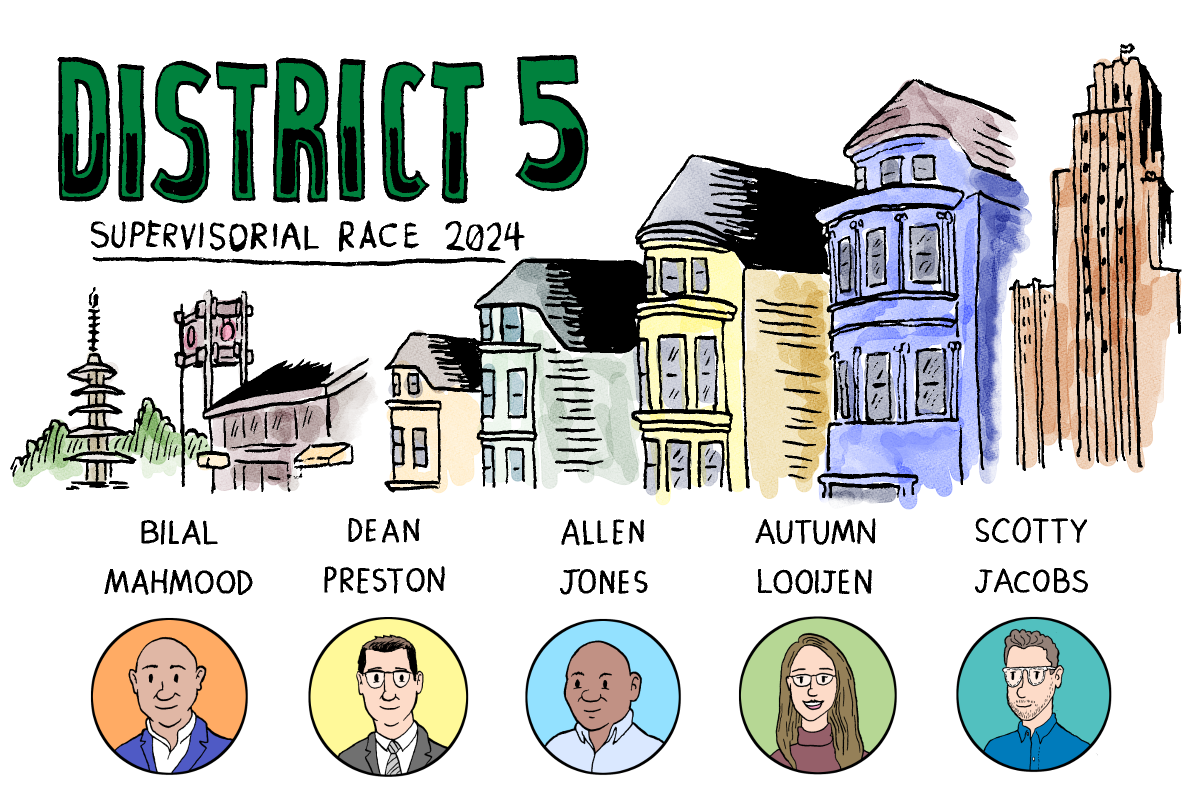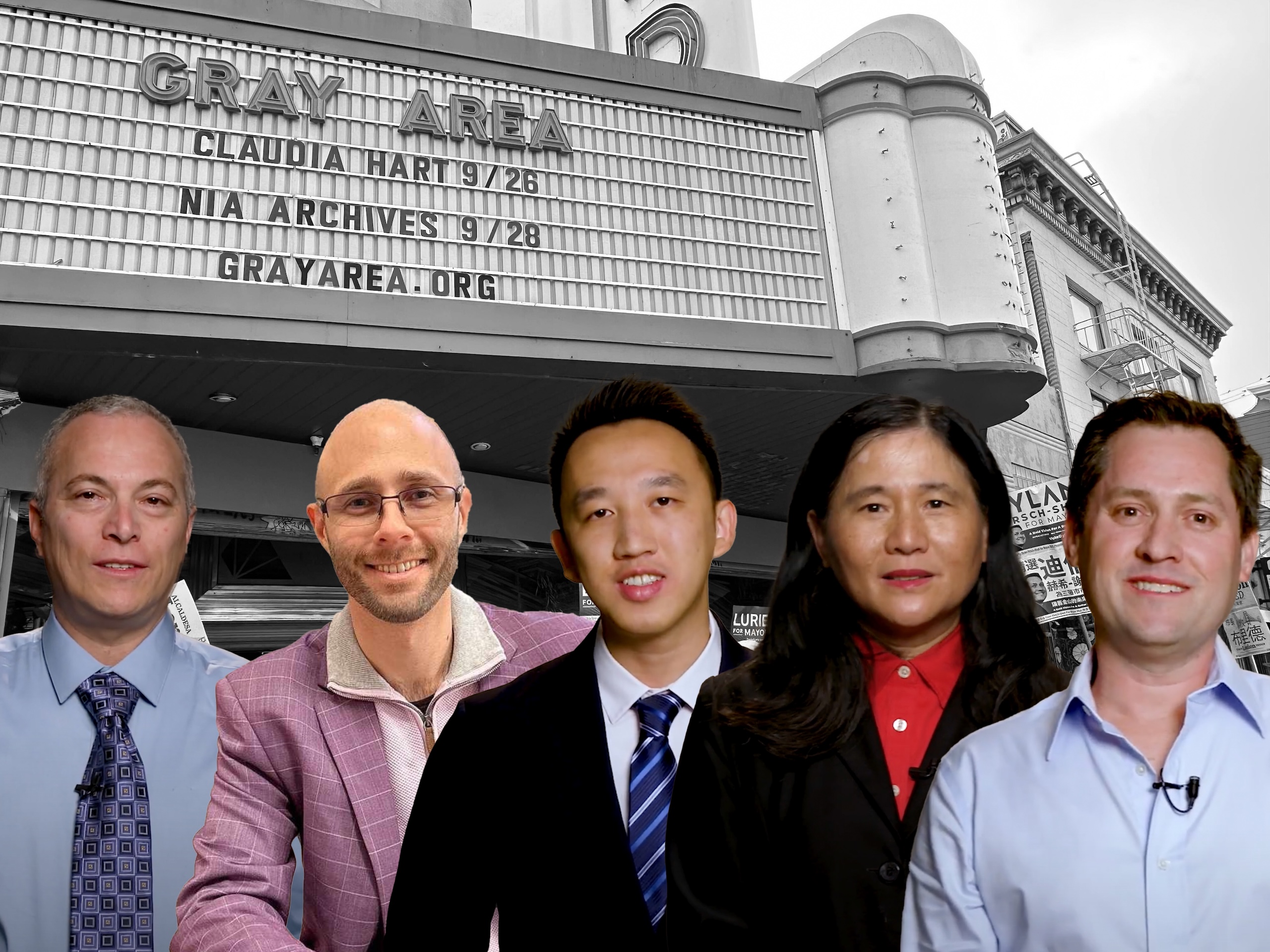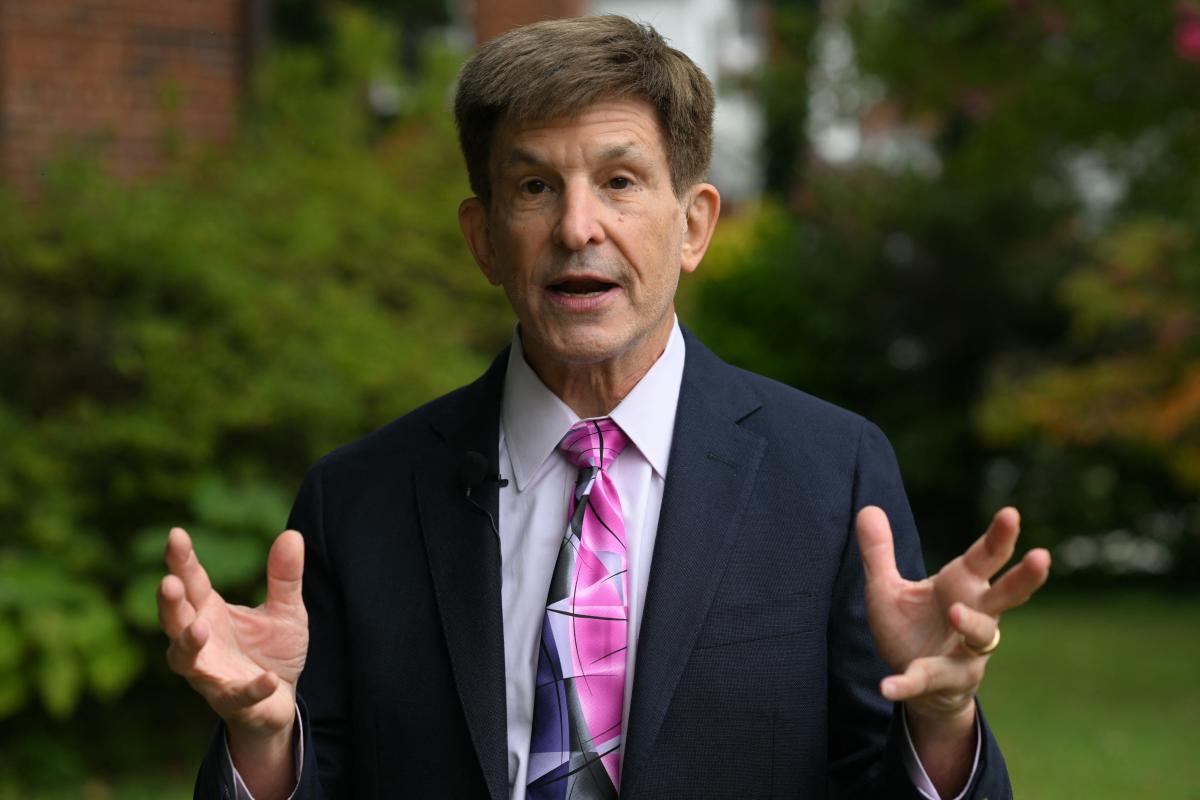[ad_1]
With the San Francisco Unified School District readying to sail off the edge of the map, 10 of the 11 declared Board of Education candidates shared their plans on proposed school closures and the district’s mammoth budget deficit with over 100 community members at a Friday night forum.
The 11 candidate, Lefteris Eleftheriou, didn’t attend the forum held at Gordon J. Lau Elementary School and moderated by Crystal Van and Emily Fung of Chinese for Affirmative Action.
The overcrowded stage made it de facto difficult for the candidates to differentiate themselves.
That, however, didn’t seem to apply to candidate Matt Alexander, the only incumbent in the race. While his nine competitors cited their prior work experiences in other industries or presented their visions for education, Alexander enjoyed an unparalleled advantage as he was able to list his accomplishments as a board member.
That includes increasing the amount of public comment at board meetings, writing the school district’s “first-ever policy” to guarantee immigrant parents’ right to interpretation and translation services during Individualized Education Program meetings, and securing $8 million city funding to expand an elementary school math program to prepare kids for algebra, according to Alexander, who has over two decades of experience as teacher and principal in public schools.
Furthermore, Alexander, the new board president, said that two weeks ago, when Superintendent Matt Wayne came to the board with a school closure plan, he felt more outreach work to families was needed. “So I said, ‘We’re not ready.’ And my board colleagues said, ‘We’re not ready.’ And that’s why we paused the plan,” Alexander said. The announcement of a school closures and mergers list has been delayed to October. And the board is scheduled to have a closed-door meeting Sunday morning to decide the fate of Wayne.
When asked about solutions to the massive deficit challenge the school district is facing, Alexander talked up plans to bring in more money and spend it more wisely. He said the Student Success Fund ballot measure he worked with the Board of Supervisors now funnels $35 million revenues to the district, and “I led the fight to reduce our oversize central office budget,” which now saves the district over $50 million a year.
Similar to Alexander, Min Chang, CEO of San Francisco healthcare organization Homebridge, shared a strong view in downsizing the central office. “In business that would not be acceptable,” she said. “Because if your customers are actually going down, you would not be increasing costs from an administration perspective.” She said she planned to look hard at the central office, both its direct costs and the indirect costs.
Chang was also the only candidate on the stage who explicitly stated her opposition to school closures. “I don’t believe closing schools is actually the solution,” she said, because that may end up driving families away from public schools and “most likely the smaller schools, the specialty schools” will be closed.
Another candidate preaching a business perspective was Ann Hsu, a former appointed school board member who lost her election after making racist comments regarding Black and Latinx families. After a two-year hiatus, she’s back: “I would ask the superintendent, for every program that we spend money on, to define metrics of success,” she said. “If they cannot meet those metrics of success, then we need to cut them.”
Hsu, who was the mayor’s pick for school board among the many Asian activists fueling the 2022 school board recall, now serves as the head of school at Bertrand D. Hsu American & Chinese Bicultural Academy, a private school she started in 2023.
Hsu also mentioned a “transition plan” to help parents if their kids’ school is going to be closed and to reinstate the School Resource Officers program with the SFPD, which expired in 2019 — “So that we can have safe schools, which are actually more basic than good academics,” she said.
Candidates John Jersin, a former LinkedIn executive, Jaime Huling, a former deputy city attorney, and Parag Gupta, a chief program officer at Mercy Housing, have all been endorsed by the San Francisco Democratic Party, United Educators of San Francisco, GrowSF and Together SF Action.
“I led organizations with a scale and beyond and beyond what the school district operates at,” said Jersin, who’s also a co-founder of education nonprofit Jersin Foundation. “I have experience leading the world’s largest professional recruiting platform, and I know how to improve our hiring like that.” He wants to have formalized agreements between schools and the police to prepare for violent situations, and protect students from overly harsh punishment.
In addition to being highly sought after by tech groups, Huling and Gupta both emphasized their working class backgrounds.
Huling emphasized the importance of hitting literacy benchmarks by third grade, because “the window to learn particular things is also very short.” She cited her past experience of litigating cases that have brought $400 million into the city budget. “I have stood up to the opioid industry and Donald Trump, and I’m ready to stand up for our students as well,” she said.
To Gupta, the mark of a quality education is retention of the best teachers. He said that once he had to teach at his daughter’s school because of the lack of teachers. “When we cut the central budget down,” he said, “we can invest that into HR and our finance systems so that we know how many teachers we have and we know how many teachers we need.”
Supryia Ray, an attorney who graduated from Harvard Law School, has also been endorsed by the city’s Democratic Party, GrowSF and Together SF Action. She added that schools also need to be a safe teaching environment for teachers. “I was really surprised to find out how often teachers themselves are subject to harassment or threats or even assault,” she said.
Candidate Virginia Cheung was previously a director at Wu Yee Children’s Services; her son goes to Alice Fong Yu Alternative School (K-8), the nation’s first Chinese immersion public school. “I feel fortunate that he will be able to talk to my dad when I can’t,” said Cheung. “It’s very important for our communities to have language access and have immersion programs.”
Laurance Lem Lee, a school board recall activist who has, in the past three years, run a newsletter titled “Eyes on SF Board of education,” emphasized empowering Asian parents and the importance of language immersion. “I hear so many stories of Asian students getting bullied and stuck in the same classroom with the person that bullied them,” he said.
According to finance filings, Jersin is leading the fundraising with $101,695, and most candidates have raised between $10,000 and $50,000. Candidate Madeline Krantz, a college student currently working towards an education degree, has not raised any money.
“I have no political alliances or endorsements. I haven’t taken a dollar from anyone,” said Krantz, 19. Because “When you talk to me, you’re hearing me and nobody else.”
A recent graduate of Abraham Lincoln High School, Krantz brought first-hand knowledge of the public school system. “When I was in high school … we actually had mold on the ceiling … I also went six weeks without a physics teacher because nobody wanted to work at our school,” she said, vowing to bring the voices of students, teachers and parents to the board. She also proposed satellite schools to provide the same quality education, and, probably, increase enrollment.

An audience member asked the candidates about their plan to improve the quality of school lunches. Krantz mentioned building school gardens because students “can see the food they’re growing and actually get to engage in it.” No student should be “stigmatized by having a free school lunch,” said Huling. Hsu wants the district to pay attention to the portions of school lunches, because it’s the “same amount from elementary to middle school to high school.”
Candidates agreed on passing Prop. A, the schools improvement and safety bond, in November to bring more money to school kitchens and other facilities.
[ad_2]
Source: missionlocal.org


















